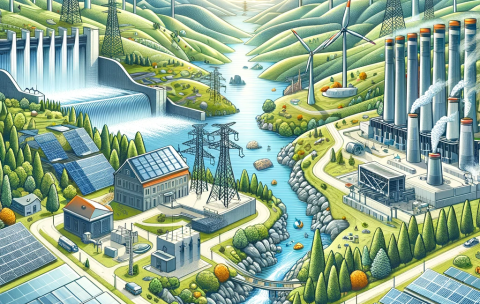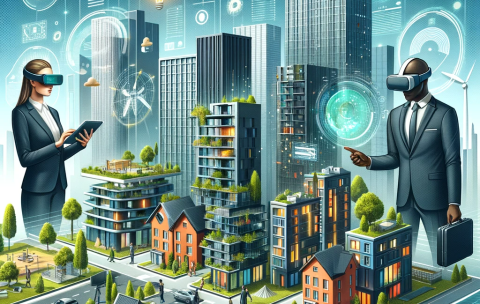Popular Instructors
All Industry-Specific Management Courses
What you'll learn
Week 1-2: Introduction to Energy Management
Overview of the global energy landscape
Key concepts in energy production, distribution, and consumption
Energy sector's impact on the economy and environment
Week 3-4: Energy Economics and Markets
Principles of energy economics
Structure and dynamics of energy markets
Pricing mechanisms and factors influencing energy prices
Week 5-6: Renewable Energy Sources and Technologies
Overview of renewable energy sources (solar, wind, hydro, geothermal)
Technological advancements in renewable energy
Integration of renewable energy into existing energy systems
Week 7-8: Energy Policy and Regulation
Role of government in energy management
Analysis of energy policies and regulatory frameworks
Global trends and variations in energy policy
Week 9-10: Energy Efficiency and Conservation
Strategies for improving energy efficiency
Energy conservation techniques in industrial and commercial sectors
Role of energy management systems and standards (e.g., ISO 50001)
Week 11-12: Sustainability in Energy Management
Sustainable energy practices and their business implications
Environmental impact assessment and mitigation
Corporate social responsibility in the energy sector
Week 13-14: Innovations and Future Trends in Energy Management
Emerging technologies in energy management (e.g., smart grids, energy storage)
The future of energy: challenges and opportunities
Case studies of innovative energy management practices
Week 15: Course Review and Final Assessment
Course Materials and Assessment:
Study Materials: Comprehensive lecture notes, case studies, video tutorials, and essential readings.
Quizzes/Case Studies: Regular quizzes and case studies for practical application of energy management concepts.
MCQs: Multiple choice questions to test understanding of energy management principles.
Simulations: Interactive simulations for practical experience in energy management scenarios.
Final Project: Developing an energy management strategy or conducting a case study analysis on energy initiatives.
Healthcare Management
Healthcare Management, a core course in the MBA program, is …
What you'll learn
Week 1-2: Introduction to Healthcare Systems
Overview of healthcare systems globally
Structure and dynamics of the healthcare industry
Key stakeholders in healthcare and their roles
Week 3-4: Healthcare Policy and Regulation
Understanding healthcare policies and regulations
The impact of regulatory bodies on healthcare management
Policy challenges and opportunities in healthcare
Week 5-6: Quality and Performance Improvement in Healthcare
Principles of quality management in healthcare
Tools and strategies for performance improvement
Measuring and evaluating healthcare outcomes
Week 7-8: Financial Management in Healthcare
Basics of healthcare finance
Budgeting, financial planning, and cost control in healthcare
Reimbursement models and revenue cycle management
Week 9-10: Healthcare Leadership and Human Resource Management
Leadership styles and their impact on healthcare organizations
Human resource challenges in healthcare
Staff training, development, and retention strategies
Week 11-12: Healthcare Information Systems and Technology
Role of information systems in healthcare
Implementing and managing health information technology
Data privacy and security in healthcare
Week 13-14: Emerging Trends in Healthcare Management
Innovations in healthcare delivery and management
The impact of telemedicine and digital health
Future challenges and opportunities in healthcare
Week 15: Course Review and Final Assessment
Course Materials and Assessment:
Study Materials: Comprehensive lecture notes, case studies, video tutorials, and essential readings.
Quizzes/Case Studies: Regular quizzes and case studies to apply healthcare management concepts.
MCQs: Multiple choice questions to test understanding of healthcare management principles.
Simulations: Interactive simulations for practical experience in healthcare management scenarios.
Final Project: Developing a healthcare management plan or conducting a case study analysis on a healthcare organization.
Hospitality Management
Hospitality Management, a core course in the MBA program, is …
What you'll learn
Week 1-2: Introduction to Hospitality Management
Overview of the hospitality industry
Key sectors: lodging, food and beverage, travel, and tourism
The role of hospitality management in customer satisfaction
Week 3-4: Service Excellence and Operations Management
Principles of service excellence in hospitality
Operational management in hotels and restaurants
Quality assurance and control in hospitality services
Week 5-6: Hospitality Marketing and Brand Management
Marketing strategies for hospitality businesses
Branding and reputation management in hospitality
Digital marketing and social media engagement
Week 7-8: Human Resource Management in Hospitality
Challenges in hospitality HR management
Staff training, development, and retention strategies
Leadership and team management in hospitality settings
Week 9-10: Financial Management in Hospitality
Financial accounting and reporting in hospitality
Revenue management and pricing strategies
Budgeting and financial planning for hospitality businesses
Week 11-12: Hospitality Law and Ethics
Legal aspects of hospitality management
Ethical considerations in hospitality operations
Compliance and regulatory issues
Week 13-14: Trends and Innovation in Hospitality
Emerging trends and technologies in the hospitality industry
Sustainable practices and eco-friendly operations
Innovation in customer service and guest experience
Week 15: Course Review and Final Assessment
Course Materials and Assessment:
Study Materials: Comprehensive lecture notes, case studies, video tutorials, and essential readings.
Quizzes/Case Studies: Regular quizzes and case studies for practical application of hospitality management concepts.
MCQs: Multiple choice questions to evaluate understanding of hospitality management principles.
Simulations: Interactive hospitality management simulations for hands-on experience.
Final Project: Developing a hospitality management plan or conducting a case study analysis on a hospitality business.
Luxury Brand Management
Luxury Brand Management, an elective course in the MBA program, …
What you'll learn
Week 1-2: Introduction to Luxury Brand Management
Defining luxury and understanding the luxury market
History and evolution of luxury brands
Characteristics of luxury products and services
Week 3-4: Consumer Behavior in Luxury Markets
Psychology of Luxury Consumers
Segmentation and targeting strategies for luxury brands
Consumer trends and insights in luxury markets
Week 5-6: Brand Positioning and Identity in Luxury
Developing a luxury brand identity
Positioning strategies for luxury brands
Case studies of successful luxury brand positioning
Week 7-8: Marketing and Communication for Luxury Brands
Marketing mix for luxury brands
Digital marketing and social media strategies for luxury
Public relations and event management in luxury
Week 9-10: Retail and Distribution Strategies in Luxury
Retail experience in luxury brand management
Distribution channels and managing exclusivity
Omni-channel strategies for luxury retail
Week 11-12: Product Development and Innovation in Luxury
Product design and development processes in luxury
Balancing tradition and innovation
Collaborations and co-branding in luxury
Week 13-14: Sustainability and Ethics in Luxury Brands
Sustainable practices in luxury brand management
Ethical challenges and corporate social responsibility
Impact of sustainability on luxury brand image
Week 15: Course Review and Final Assessment
Course Materials and Assessment:
Study Materials: Comprehensive lecture notes, case studies, video tutorials, and essential readings.
Quizzes/Case Studies: Regular quizzes and case studies for practical application of luxury brand management concepts.
MCQs: Multiple choice questions to assess understanding of luxury brand management principles.
Simulations: Interactive simulations related to luxury brand scenarios for experiential learning.
Final Project: Developing a luxury brand strategy or conducting a market analysis for a luxury brand.
Luxury Hospitality and Events Management
Luxury Hospitality and Events Management, an elective course in the …
What you'll learn
Week 1-2: Foundations of Luxury Hospitality
Understanding luxury in the hospitality industry
Characteristics of Luxury Hospitality Services
The evolution and trends in luxury hospitality
Week 3-4: Customer Relationship Management in Luxury Hospitality
Building strong customer relationships in luxury settings
Personalization and customization in service delivery
Managing high-end clientele and VIP services
Week 5-6: Operations Management in Luxury Hotels and Resorts
Operational aspects of luxury hotels and resorts
Quality control and maintaining service excellence
Managing luxury accommodations and facilities
Week 7-8: Luxury Events Planning and Execution
Fundamentals of Luxury Event Management
Designing and executing high-profile events
Vendor and venue management for luxury events
Week 9-10: Marketing and Branding in Luxury Hospitality and Events
Marketing strategies for luxury hospitality brands
Brand management and positioning in the luxury market
Digital marketing and social media in luxury hospitality
Week 11-12: Financial Management in Luxury Hospitality
Financial planning and budgeting for luxury hotels and events
Revenue management and pricing strategies
Cost control without compromising luxury standards
Week 13-14: Sustainability and Ethics in Luxury Hospitality and Events
Incorporating sustainable practices in luxury hospitality
Ethical considerations and corporate social responsibility
Balancing luxury and sustainability
Week 15: Course Review and Final Assessment
Course Materials and Assessment:
Study Materials: Comprehensive lecture notes, case studies, video tutorials, and essential readings.
Quizzes/Case Studies: Regular quizzes and case studies for practical application of luxury hospitality and event management concepts.
MCQs: Multiple choice questions to test understanding of the luxury hospitality and event industry.
Simulations: Interactive simulations for experiential learning in luxury hospitality and event scenarios.
Final Project: Developing a comprehensive plan for a luxury hospitality venture or a high-end event.
Trends in Sports Management
Sports management involves the planning, organizing, and overseeing of activities …
What you'll learn
Introduction to Sports Management:
Digital Transformation in Sports:
Data Analytics in Sports:
Sports Marketing and Branding:
Fan Engagement and Experience:
Sustainability in Sports:
Globalization of Sports:
Esports and Virtual Sports Management:
Athlete Management and Well-being:
Legal and Ethical Considerations in Sports:
Trends in Real Estate Management
Real estate management involves the operation, control, and oversight of …
What you'll learn
Introduction to Real Estate Management:
Define real estate management and its significance in the context of property ownership.
Explore the key functions and responsibilities of real estate managers.
Digital Transformation in Real Estate:
Identify and analyze trends in digital transformation within the real estate industry.
Explore technologies shaping property management, marketing, and customer engagement.
Sustainable Practices in Real Estate:
Discuss the growing importance of sustainability in real estate management.
Explore eco-friendly practices, green building trends, and their impact on property value.
Data Analytics for Market Insights:
Understand the use of data analytics for gaining market insights in real estate.
Explore how analytics inform property valuation, investment decisions, and market trends.
Innovations in Property Development:
Explore emerging trends in property development and design.
Discuss how innovations shape the physical aspects of real estate projects.
Proptech and Smart Cities:
Discuss the role of Proptech (Property Technology) in real estate management.
Explore trends in developing smart cities and their impact on real estate.
Flexible Workspaces and Commercial Real Estate:
Explore trends in flexible workspaces and their impact on commercial real estate.
Discuss how changing work patterns influence office space design and management.
Urbanization and Mixed-Use Developments:
Discuss trends in urbanization and the rise of mixed-use developments.
Explore the integration of residential, commercial, and recreational spaces.
Real Estate Investment Strategies:
Explore trends in real estate investment strategies.
Discuss factors influencing investment decisions and risk management.
Legal and Regulatory Landscape:
Discuss the legal and regulatory considerations in real estate management.
Explore trends in property laws, zoning regulations, and compliance.
Renewable Energy Technologies
Renewable energy refers to energy derived from natural processes that …
What you'll learn
Understanding Renewable Energy: Grasp basic concepts and the importance of renewable energy.
Types of Renewable Energy: Explore different types, such as solar, wind, hydro, and biomass.
Technology Behind Renewable Energy: Understand the technological principles of renewable energy systems.
Economic Aspects: Analyze the economic implications and business models related to renewable energy.
Environmental Impact: Learn about the environmental benefits and sustainability aspects.
Policy and Regulatory Frameworks: Study government policies and regulations impacting renewable energy.
Innovation in Renewable Technologies: Examine recent innovations and advancements in the field.
Challenges and Barriers: Understand the challenges in adopting renewable energy technologies.
Case Studies: Review real-world examples of successful renewable energy projects.
Future Trends: Discuss emerging trends and the future scope in renewable energy.










